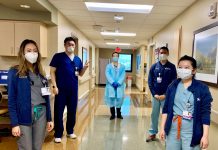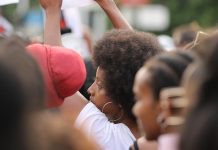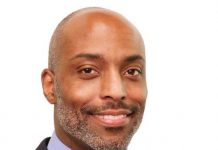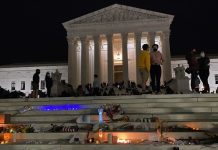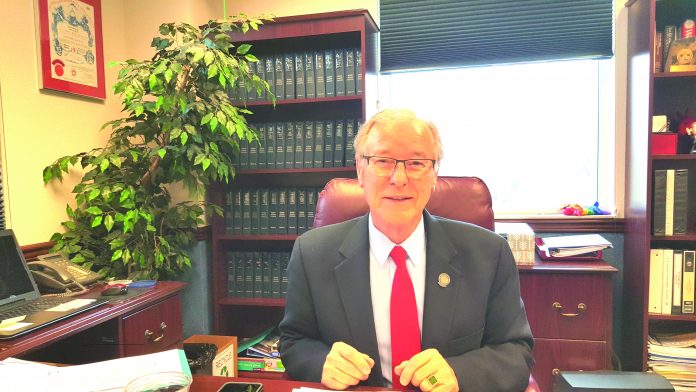“A political lifetime,” David Parks said in an oral history interview 20 years ago, “can be really short.”
This year, Parks concludes a career in state and local government that has lasted 50 years, 24 of them spent in the Nevada State Legislature as an assemblyman and senator. In that time, Parks and other legislators he persuaded to follow him legislated equality and protection for LGBTQ+ citizens in every aspect of their lives. USA Today, in fact, has placed Nevada first among the 50 states as most gay-welcoming.
Parks went to work for the city of Las Vegas in 1971 and eventually became director of the Office of Budget and Management. He was senior management analyst in the Clark County Manager’s office, assistant director of the Regional Transportation Commission and chairman of the Paradise Town Advisory Board. He served as AFAN board president for 12 years and was one of the first appointees to the newly established Nevada Statewide AIDS Advisory Task Force in 1987. Nine years later,Parks was persuaded to run for Nevada’s Assembly District 41.
“When I was first approached to run for office in 1996,” Parks said, “I didn’t have any intention of running. I said, ‘I’ll never say never, but I don’t think you want to count on it.’ ”
Parks’ greatest promoter at the time was Las Vegas physician Dr. Jerry Cade, who would later become a pioneer in AIDS medicine. When he found out Parks was considering a run, Cade said, “I think David was the best candidate. (He’s) quietly gay. Not closeted, but quietly gay. Has worked his heart out and done a ton of stuff and is incredibly brilliant. He was the perfect candidate.”
The elephant in the room, though, was Parks’ homosexuality. He’d lobbied and testified at the Nevada Legislature for 20 years and had seen both closeted and openly gay candidates run for office, “which didn’t go over very well,” he said. “So, I had a meeting with Dina Titus. I told her I’m openly gay. She said, ‘If you run would you deny that you’re gay?’ I think she was testing me to see where I was coming from. I said, ‘That would be an exercise in futility because
everyone knows I’m gay.’ ”
That question was settled, Parks was still reluctant to run. Considering the homophobia he would likely face as a gay candidate and wondering if he had that “fire in the belly” that makes a successful politician, Parks did not make up his mind until almost the last minute. Debating himself, he finally said, “Oh, what the hell. Go ahead and do it! So, I ended up filing for office totally unprepared. Not knowing what I was going to do.”
With support from Cade, Gov. Bob Miller, businessman Joe Lamarca, then-state senator Titus, and the Gay and Lesbian Victory Fund, Parks won Assembly District 41 and became Nevada’s first openly gay state legislator.
Despite claiming to be unprepared for his win, Parks had three pieces of legislation to introduce. Because he was fired in 1984 from the city of Las Vegas for being gay, Parks wanted to address employment non-discrimination. Because he had long been advocating for the HIV and AIDS community, he wanted the state to start spending money it received from the federal government on HIV and AIDS programs rather than on salaries and programs that had nothing to do with HIV. Finally, Parks wanted to establish an exchange program for users to turn in dirty needles for clean ones. While the head of the Democratic Caucus felt these bills were too controversial for a freshman legislator to introduce and advised against it, Parks pressed ahead.
And he was successful: All three of his bills were eventually passed.
While Parks has facilitated much progressive legislation, his legacy lies with his legislative support of Nevada’s LGBTQ+ community. Among the legislation Parks introduced, sponsored, or cosponsored is Nevada’s Employment Non-Discrimination Act; hospital visitation rights; equal access to public accommodation; domestic partnership benefits; transgender rights; expanding class definitions in the state’s hate crimes law to include gender identity and expression; proscription of conversion therapy in Nevada; and benefits protection for Nevada’s LGBTQ+ veterans.
But of all his LGBTQ+- supportive legislation Parks feels that establishing Nevada’s domestic partner registry in 2009 is the most important.
“What made that (bill) a challenge,” Parks said, “is that I was successful in getting it passed out of the Senate and the Assembly and it went to the governor (Jim Gibbons) and the governor vetoed the bill.” When Parks suggested the Legislature override Gibbons’ veto, he was discouraged.
Nevertheless, Parks recalled: “I said I think we should override his veto. I think we should show him we’re not going to concede.” Parks feels it wasn’t so much the bipartisan support of the bill that led to an override vote, as it was Gibbons himself.
“The governor was so disliked,” Parks sid. “He’d vetoed other bills and got other people upset. I think it was an opportunity the Legislature had that they could just give him the shaft.” The Legislature successfully overrode Gibbons’ veto. Passing Senate Bill 283 prepared the legislative ground for same-gender marriage a few years later.
Parks has left several parting gifts to Nevada’s LGBTQ+ community in the 2019 session. Among these are bills banning the “gay panic” defense; requiring schools to adopt policies to address suicide prevention, specifically addressing LGBTQ+ youth; and prohibiting discriminatory practices by medical care providers and facilities.
Equally important, Parks and other state senators sponsored SB 284 to establish the Advisory Task Force on HIV Exposure Modernization. The task force has studied Nevada’s statutory criminalization of HIV exposure and produced a report with recommendations to change those statutes. For instance, Nevada Revised Statute 201.205 makes it a felony for an HIV+ person to “knowingly or willfully” expose another to the virus, punishable by two to ten years in the state prison and and/or a $10,000 fine.
“There was a point in time,” Parks said “when states across the country (passed) some pretty onerous legislation.”
Nevada included. Understanding and treatment of HIV long ago mitigated the virus so that punitive legislation passed during the great scare of the 1980s-1990s is now simply cruel and needs to be changed.
On the eve of his political retirement and approaching his 77th birthday, Parks reflected on his legislative career.
Parks said he feels his biggest influence on the Legislature itself was his “being openly gay and (being) an effective legislator. I think that changed stereotypes some people assumed.”
Parks throughout his career was consistently noted among the top five legislators in both houses. Further despite animosity between the parties, Parks worked both sides of the aisle expertly.
“(My colleagues) are probably a little disappointed I’m being termed out,” Parks said, “because they always saw that I was a reasonable voice.” State Sen. Pat Spearman (D-Las Vegas) has worked with Parks to help fight for the rights of Las Vegas LGBTQ+ community.
“David Parks, epitomizes strength, courage, empathy and persistence. Every pro-equality bill in the Nevada Revised Statutes is a result of his quiet diligence as a member of the Nevada Legislature. For many years, David was the only out (elected) member of the LGBTQ+ community. He used his time as a policymaker to sponsor bills that lifted the downtroddened; humanized people living in the shadows of society; tore down walls of discrimination and built bridges to acceptance, understanding and inclusion. He’s a mentor, exemplar, but most importantly — David is my friend. I will miss his presence in the State Senate but look forward to his input on future legislation.”
Parks isn’t sure what’s next for him. He was urged to run this year for the university Board of Regents but stood down. Lobbying firms have expressed an interest in his services.
“It was an honor to serve 24 years in the Nevada Legislature,” Parks said. “(But,) do I totally walk away, wash my hands of it? Or — do I have a political future?” He has no answer, yet.
As far as the Legislature is concerned, however, Parks has faith in its LGBTQ+ support.
“I’m confident that we’re on a forward path,” he said. “The change in attitudes has been so swift, almost radical. In 1996 I would never have envisioned where we would be, today.”
And, where we are today, is largely thanks to retiring Nevada State Senator David Parks.





